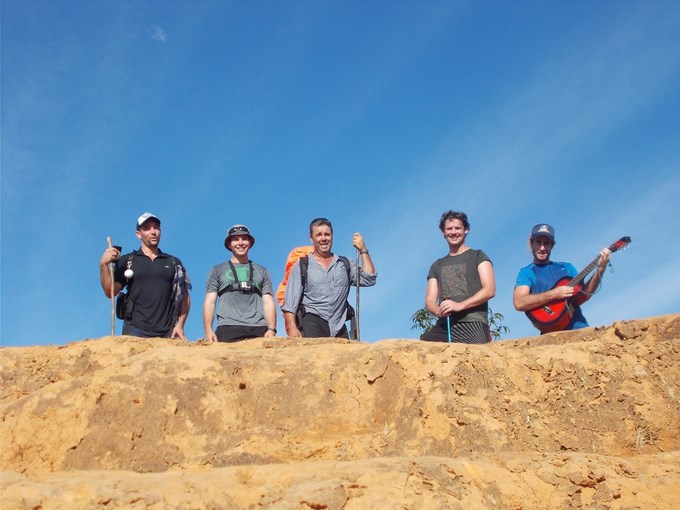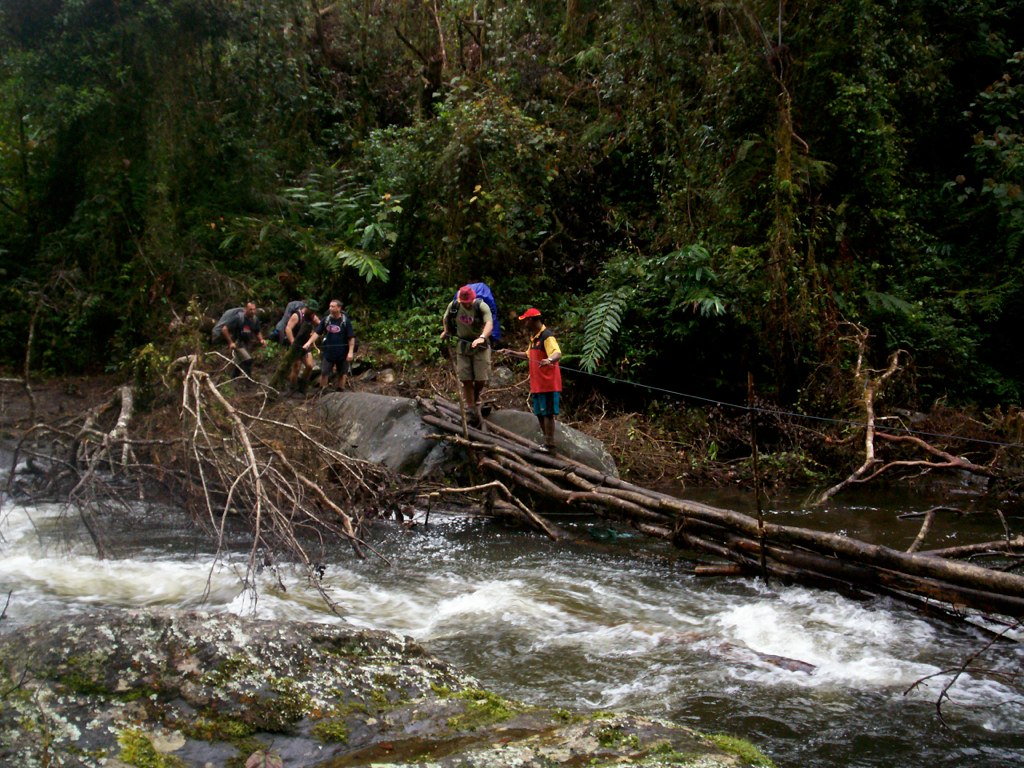To make your Kokoda trekking adventure a thoroughly enjoyable and safe experience, we ask that you take time to read and understand the following useful travel advice.
Kokoda Trail in Brief
Papua New Guinea is a developing country and most facilities that you would normally take for granted at your home country are considered a luxury in PNG. The Kokoda Trek is not a walk in the park and can be extremely difficult and strenuous. The difficulty of the trek should only be seen from one perspective as the ultimate challenge of human endurance, perseverance and the human spirit and inner strength. Along the trek, what you may lose in terms of comfort will be made up for with the rewarding experience of walking a trek that shaped our current history and ensured our freedom. Over and above this, you will marvel at some of the most natural and pristine flora and unique fauna of PNG and will encounter rich and diverse cultures of people along the trail. Their friendly hospitality and welcoming smiles will reassure you that you are in good company and are welcome to share in their rich history and culture. It’s not uncommon to see villagers coming forward to welcome you with a bear hug and offering local fruits and vegetables as a sign of their friendship and local hospitality. Always, it is important to keep an open mind, apply your true spirit of adventure and be positive. You will win many friends and the memories will stay with you.
Appropriate Clothing and Footwear
The Kokoda Trail, although a mountainous region, is considered a part of the coastal areas of PNG and can be hot and humid. You are best advised to wear light clothing, preferably long sleeved shirts. You will need to pack extra shorts, t/shirts, socks and a second pair of strong walking shoes apart from your other necessities. For female walkers, tight or revealing clothing is not advisable as it may be frowned upon by locals and guides. It’s always advisable to bring along malaria medication, insect repellent, a sun hat, screen lotion, rain jacket, a torch, camera, plenty of spare batteries and a positive attitude. A full list of important items and equipment will be provided in your pre-departure brief. All trek equipment must always be tested prior to trek departure.
Climate Conditions
There are two seasons in PNG. It’s either wet or dry all throughout the country at different times of the year. Coastal areas experience temperatures that range between 24-35 degrees C (75-95 F) with high humidity. In the cooler Highlands, you can expect anything between 12-28 degrees (54-82F) and with less humidity. PNG does not experience devastating cyclones, typhoons and hurricanes. The wet season is normally from November to March although different areas will see a variation.
Cultural Dos and Don’ts
It’s important to understand that when as you are trekking, you are walking through “someone’s backyard” and everything is either communally owned or owned by a family or tribe. Always remember, there are certain cultural taboos that must be observed. Always ask your local guide if you are not sure if a certain request will or will not offend the local people and their custom. Please do not hand out gifts as this may encourage a dependent mentality among the local people. If you are being asked to pay to take a photograph, it is best not to take the photo as paying will encourage a dependent mentality and other demands. For a truly rewarding cultural experience, ask your local guides as many questions as you can. They are nearly always shy and it’s up to you to ask simple questions about the local culture, history, flora, fauna and local issues.
Currency and Valuables
The unit of currency is the Kina, pronounced “kee-nah”, and sub-units of 100 are called Toea, pronounced “toy-ya”. Note denominations are available in K2, K5, K10, K20, K50 and K100. To pay for other goods and services before and after the trek, travellers’ cheques and international credit cards are accepted at most major hotels and retailers including American Express, Diners Club, Master Cars and Visa credit cards. Before leaving your country, we ask that you buy Kina cash at the traveller exchanges of the international departure ports of Sydney, Brisbane, Cairns, Singapore, Manila and Narita (Tokyo). If you are connecting on a domestic flight on the same day, you may not have the time to do your bank transactions in PNG. Banks operate between 9:00 am – 4:00 pm Monday to Friday although the BSP Bank at the International Airport is open 7 days a week to co-incide with overseas flights. On the trek itself, you are best advised not to carry valuables including large amounts of cash. Before you depart for the trek, be sure to leave your valuable items with the hotel or tour operations office in Port Moresby for safekeeping. Only small change is required for buying local fruits, vegetables, artefacts and other local souvenir items.
Health and Safety Issues
Consult your doctor for any medical condition that you have before departing for PNG. Also, prior pre-departure training is highly recommended. Malaria medications are strongly recommended. Also, it is advisable to keep your tetanus, typhoid, hepatitis, and polio inoculations current. Diarrhoea and dysentery are not severe in PNG as is the case in Asian countries. You are required to provide a copy of your medical declaration before the commencement of the trek. A copy should be given to the trek tour operator for file.
Insurance and Medical Issues
You are strongly advised to purchase ‘Travel Insurance’ in your home country to cover for unexpected trip cancellation and delays, loss and damage to baggage, and for illness, accident and medical evacuation. It is also a requirement that you provide us with your travel insurance policy number and 24hour contact phone number in case we have to arrange a medevac on your behalf off the Kokoda Trail. By signing the Client Trek Contract, you are making an undertaking that you understand the risks involved and possible dangers. Government and church-run aid posts are not found along the trek and trekkers are recommended to pack their own basic first aid medical kit. In case of emergencies, we have Satellite Phone and HF radio are situated along some villages along the trail for emergencies.
Language and Communication
PNG has about 800 languages and most Papua New Guineans speak at least two languages. The official national language is English and the two other most commonly used languages are Hiri Motu and Tok Pisin. Most guides will speak English apart from Motu and one other local language. Always ask if you do not understand what’s being said.
Passport, Visa and Immigration
All visitors to PNG including tourists are required to have a visa to enter PNG. Currently a 30-day tourist visa is available upon arrival for nationals of many countries including Australia, Japan, New Zealand, UK, USA and most western European countries at Port Moresby’s Jackson’s International Airport. This visa is non-extendable and the fee is currently NIL. To acquire a visa upon arrival, you will need a valid passport, proof of sufficient funds for your stay, an onward airline ticket with confirmed bookings and Kina cash. Alternatively, you may acquire your visa prior to leaving your home country with either the nearest PNG Embassy or in some cases at the Australian Embassy in your country. Always check with these embassies for current visa requirements prior to leaving home. It’s now normal practice for airport departure taxes to be built into the price of your international air ticket.
Security
PNG has its share of security problems just like everywhere else in the world. Most negative stories that are published in the media are mainly occurrences in the capital, Port Moresby. Even then, not all parts of Port Moresby are troublesome. There are numerous places that you can visit which are totally free of incidents. What’s important to know is the fact that the rest of Papua New Guinea is safe for travel by tourists and residents alike. Unfortunately, most people from overseas and visitors alike never get the chance to know the good, positive and interesting features about PNG people, culture and places because everyone hears and dwells only on the negative news that PNG receives from bad press. A positive advice to apply common sense in everything that you do and do not put yourself in a vulnerable situation that may cause you any distress. Take precautions at all times and always ask your guide for advice.
Time
PNG is 10 hours ahead of Greenwich Mean Time and is on the same time as winter time in Sydney, Australia, or Eastern Standard Time in Australia.
Tipping
Tipping in PNG is not expected but a personal choice. If you would like to show your appreciation to a particular guide for a job well done, do so at your own discretion. Also, remember to mention the good service provided to a member of the tour operations management to be used as an example to encourage better staff performance and excellence. If you hire a personal porter it is preferred that you tip him directly. Minimum tip would be K50 plus a suggested item from your gear such as a head torch would be most appreciated. Food porters are generally tipped by everyone in the trekking group by each person contributing whatever they can afford to be shared among all food porters.




